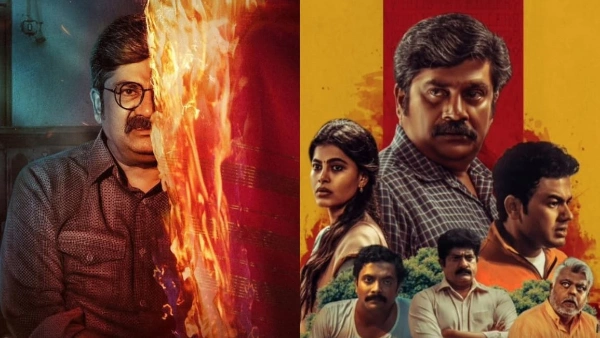The strength of the film comes from its screenplay structure, which gives us information in increments and adds an existential layer to the basic premise of a murder mystery. The rest of this review may contain spoilers.
Right from the opening, Agnyathavasi sets out to deceive the viewer, in the sense that you think it’s one thing but much later you discover that it’s something else. You think it’s a man chasing another man in a forest, because both men are running and their expressions suggest some kind of tension – but it’s not that. The way the scene ends, it ties neatly to our protagonist, played by Rangayana Raghu. He is an Inspector in a village, where nothing seems to happen – until it does. Imagine RK Narayan meets Agatha Christie, with a potent serving of existentialism and guilt and God: that’s the flavour of this intriguing crime drama set in pre-Y2K times. The thing that kicks things off is the arrival of a boxy computer with Internet connectivity, with the local postman slowly being replaced by emails.
The film goes back and forth in time, between a distant past and a more recent past. In the second time frame, everything is connected to computers or to this particular computer in the village, owned by a young man named Rohit (Siddu Moolimani). For instance, why has Srinivasiah (Sharath Lohitashwa) cut off ties with his son? It’s because the son went abroad to work in computer technology. Why do the two human deaths in the film occur? It’s due to events instigated by Rohit’s computer. The meals of chicken, the story arc of Pankaja (beautifully played by Paavana Gowda), Rohit’s plans for a business, Rohit’s involvement with Pankaja – everything Is linked to this computer. Agnyathavasi is not questioning whether technology is a boon or bane. But the device does act like a mysterious black box in a sci-fi movie, something that causes a lot of trouble by influencing the emotions and actions of the people around it.

And this is why Agnyathavasi, written by PM Krisnna Raj, is fascinating. On the one hand, we have a good, old murder mystery around the dead people. On the other hand, there’s this extra layer of mystery around the happenings in the various timelines. The screenplay lays out scenes that make you ask questions, and provides answers later. You ask: Why does the Inspector perform his mother’s annual death rites with such diligence, to the extent that he cooks every item himself? Why don’t his siblings visit him, despite the early dialogue-heavy parts establishing that he raised them like a parent? Why is there so much emphasis on a rooster, as though the creature is a ghost from the past? What is with the sudden cut to a herd of elephants? Is there a link between the mother and her calf, and the other parent-child equations in the movie?
Agnyathavasi spends too much time delineating the Inspector’s character at the start, but once the “plot”, so to speak, kicks in, it gathers force without feeling forced. The information is given to us in little increments that make us keep changing our minds about who people are and the things they are capable of. Early on, in a heavy-handed scene, a devout man plucks flowers for worship, but he leaves some flowers on the plant. He thinks it’s an act of empathy. He does not want to deprive the plant of all its beauty. But this also raises the question: Why even pluck those few flowers in the first place? Why not leave the plant alone, and maybe pick up only fallen flowers? These asides make you wonder about humankind. Even when we think we are doing the right thing, our imperfections shine through. And this is reflected in the film’s most pointed lines. A character says that parents raise children with a lot of dreams. If parents learnt to mind their limits and not manipulate these children’s lives, then all will be well. In other words, even when we think we are doing the right thing, our imperfections shine through. That’s a really refreshing layer to find in what’s essentially a murder mystery.


